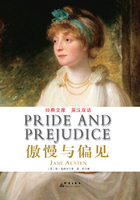
第5章
Within a short walk of Longbourn lived a family with whom the Bennets were particularly intimate. Sir William Lucas had been formerly in trade in Meryton, where he had made a tolerable fortune and risen to the honour of knighthood by an address to the King during his mayoralty. The distinction had perhaps been felt too strongly. It had given him a disgust to his business and to his residence in a small market town; and quitting them both, he had removed with his family to a house about a mile from Meryton, denominated from that period Lucas Lodge, where he could think with pleasure of his own importance, and, unshackled by business, occupy himself solely in being civil to all the world. For though elated by his rank, it did not render him supercilious; on the contrary, he was all attention to everybody. By nature inoffensive, friendly and obliging, his presentation at St. James's had made him courteous.
Lady Lucas was a very good kind of woman, not too clever to be a valuable neighbour to Mrs. Bennet. —They had several children. The eldest of them, a sensible, intelligent young woman, about twenty-seven, was Elizabeth's intimate friend.
That the Miss Lucases and the Miss Bennets should meet to talk over a ball was absolutely necessary; and the morning after the assembly brought the former to Longbourn to hear and to communicate.
“You began the evening well, Charlotte,”said Mrs. Bennet with civil self-command to Miss Lucas.“You were Mr. Bingley's first choice.”
“Yes; —but he seemed to like his second better.”
“Oh! -you mean Jane, I suppose-because he danced with her twice. To be sure that did seem as if he admired her-indeed I rather believe he did-I heard something about it-but I hardly know what-something about Mr. Robinson.”
“Perhaps you mean what I overheard between him and Mr. Robinson; did not I mention it to you? Mr. Robinson's asking him how he liked our Meryton assemblies, and whether he did not think there were a great many pretty women in the room, and which he thought the prettiest? and his answering immediately to the last question—‘Oh! the eldest Miss Bennet beyond a doubt, there cannot be two opinions on that point.'”
“Upon my word! -Well, that was very decided indeed-that does seem as if-but, however, it may all come to nothing, you know.”
“My overhearings were more to the purpose than yours, Eliza,”said Charlotte.“Mr. Darcy is not so well worth listening to as his friend, is he? —Poor Eliza! —to be only just tolerable.”
“I beg you would not put it into Lizzy's head to be vexed by his ill-treatment; for he is such a disagreeable man that it would be quite a misfortune to be liked by him. Mrs. Long told me last night that he sat close to her for half an hour without once opening his lips.”
“Are you quite sure, Ma'am? —is not there a little mistake?”said Jane. —“I certainly saw Mr. Darcy speaking to her.”
“Aye-because she asked him at last how he liked Netherfield, and he could not help answering her; -but she said he seemed very angry at being spoke to.”
“Miss Bingley told me,”said Jane,“that he never speaks much unless among his intimate acquaintance. With them he is remarkably agreeable.”
“I do not believe a word of it, my dear. If he had been so very agreeable, he would have talked to Mrs. Long. But I can guess how it was; everybody says that he is ate up with pride, and I dare say he had heard somehow that Mrs. Long does not keep a carriage, and had come to the ball in a hack chaise.”
“I do not mind his not talking to Mrs. Long,”said Miss Lucas,“but I wish he had danced with Eliza.”
“Another time, Lizzy,”said her mother,“I would not dance with him, if I were you.”
“I believe, Ma'am, I may safely promise you never to dance with him.”
“His pride,”said Miss Lucas,“does not offend me so much as pride often does, because there is an excuse for it. One cannot wonder that so very fine a young man, with family, fortune, everything in his favour, should think highly of himself. If I may so express it, he has a right to be proud.”
“That is very true,”replied Elizabeth,“and I could easily forgive his pride, if he had not mortified mine.”
“Pride,”observed Mary, who piqued herself upon the solidity of her reflections,“is a very common failing I believe. By all that I have ever read, I am convinced that it is very common indeed, that human nature is particularly prone to it, and that there are very few of us who do not cherish a feeling of self-complacency on the score of some quality or other, real or imaginary. Vanity and pride are different things, though the words are often used synonimously. A person may be proud without being vain. Pride relates more to our opinion of ourselves, vanity to what we would have others think of us.”
“If I were as rich as Mr. Darcy,”cried a young Lucas who came with his sisters,“I should not care how proud I was. I would keep a pack of foxhounds, and drink a bottle of wine every day.”
“Then you would drink a great deal more than you ought,”said Mrs. Bennet;“and if I were to see you at it, I should take away your bottle directly.”
The boy protested that she should not; she continued to declare that she would, and the argument ended only with the visit.
离朗伯恩村不远处住着一户人家,跟贝内特家格外亲密。威廉·卢卡斯爵士原来在魅力屯做生意,发了一笔不小的横财,担任镇长期间,因上书国王有功,荣获爵士封号。也许他觉得这个荣誉过重。这使他讨厌做生意,讨厌住在一个小集镇上,于是就放弃生意,离开小镇,举家迁到了距离魅力屯大约一英里的一座房子里,从那时起就把那个地方称为卢卡斯庄园,他可以在那里愉快地寻思自己的显要地位,并摆脱了生意的羁绊,可以一门心思礼待世人。尽管他因自己的地位而洋洋得意,但这并没有使他目空一切。正好相反,他对每个人都很周到,天生不爱惹人,生性友善,热心助人,到圣詹姆斯宫的觐见使他变得彬彬有礼。
卢卡斯太太心地善良,不是过于精明,所以不失为贝内特太太的宝贵邻居。——卢卡斯夫妇有好几个孩子。其中最大的是通情达理、聪明伶俐的千金,大约二十七岁,是伊丽莎白的密友。
卢卡斯家的千金们和贝内特家的千金们见见面聊聊舞会,是绝对必要的;所以,聚会后第二天上午,卢卡斯家的千金们就前往朗伯恩村听取意见、交流看法。
“夏洛特,你在晚会上开了个好头,”贝内特太太既克制又客气地对卢卡斯家大小姐说。“你可是宾利先生的首选哟。”
“是的——可他好像更喜欢第二个舞伴。”
“噢!——我想,你是说简吧——因为他跟简跳过两次舞。自然,他的确像是喜欢她——我的确有些相信他是这样——我也有所耳闻——而我几乎什么也不知道——就是有关鲁宾逊先生的事儿。”
“大概你是说我无意中听到了他和鲁宾逊先生之间的谈话吧;我不是对你提到过这件事吗?鲁宾逊先生问他喜欢不喜欢我们魅力屯的舞会,问他是不是觉得舞场里的女宾们有好多都非常漂亮,问他认为哪一个最漂亮?他马上回答了最后一个问题——‘噢!毫无疑问是贝内特家的大小姐;对这一点,不可能有两种看法。'”
“的确是!——啊,那的确是定论——看上去的确像是——不过,不管怎样,也许会全都落空,你知道。”
“伊莱扎,我无意中听到的话比你听到的更得要领,”夏洛特说,“达西先生不像他朋友的话那样值得一听,对吗?——可怜的伊莱扎!——只是认为还可以。”
“我请你不要再提这件事,让丽齐想起他的无礼举动就恼怒;因为他是那样一个令人讨厌的人,被他喜欢才倒大霉呢。朗太太昨晚告诉我说,他在她的身边坐了半个小时,也没有开过一次口。”
“你就那样肯定,妈妈?——是不是有点小误会?”简说,“我的确看见达西先生在跟她说话。”
“是的——因为她最后问起他是不是喜欢内瑟菲尔德庄园,他才不得不回答她;——不过,她说他好像对有人跟他说话十分生气。”
“宾利小姐告诉我说,”简说,“他从来不多说话,除非是跟他亲密的熟人在一起。他跟熟人非常容易相处。”
“这种话我一个字都不相信。他要是那样和蔼可亲,就会跟朗太太说话的。不过,我可以猜出这是怎么回事;大家都说他极其傲慢;我敢说,他不知怎么听说了朗太太没有马车,是坐出租马车来参加舞会的。”
“我不介意他是不是跟朗太太说话,”卢卡斯小姐说,“不过,我真希望他当时跟伊莱扎跳舞。”
她的妈妈说:“丽齐,我要是你的话,下次就不会跟他跳舞。”
“妈妈,我相信,我可以有把握地向你保证绝不跟他跳舞。”
“他的傲慢,”卢卡斯小姐说,“并不像通常的骄傲那样使我非常生气,因为他的傲慢情有可原。这么出色的一个小伙子,出身好,又有钱,什么都得天独厚,难怪他会自命清高。我要是可以这样说的话,那就是他有权傲慢。”
“这话不错,”伊丽莎白回答说,“要是他没有羞辱我的自尊,我就可以轻易地原谅他的傲慢。”
“傲慢,”玛丽评论道,自以为思维缜密,无懈可击。“我相信,是非常普遍的缺点。从读过的所有书来看,我深信那的确非常普遍,人性特别容易趋向这一点,因为自己具有这样或那样的品质而怀有沾沾自喜感情的人,无论是真实的还是想象的,我们没有几个人不是这样。虚荣和傲慢是截然不同的两件事,尽管用词上常常当作同义词。一个人可以傲慢,不要虚荣。傲慢更多是指我们对自己的看法,虚荣则是指我们想要别人对我们的看法。”
“要是我像达西先生那样有钱,”跟姐姐们一起来的卢家少爷嚷道,“我才不在乎自己有多么傲慢呢。我要养一群猎狗,每天喝一瓶葡萄酒。”
“那你就喝得太多了,”贝内特太太说,“我要是看见你喝酒,就会立刻夺走你的酒瓶。”
那个男孩抗议说,她不应该那样;她接着又宣布说,她一定会那样,这场辩论因拜访结束而终止。